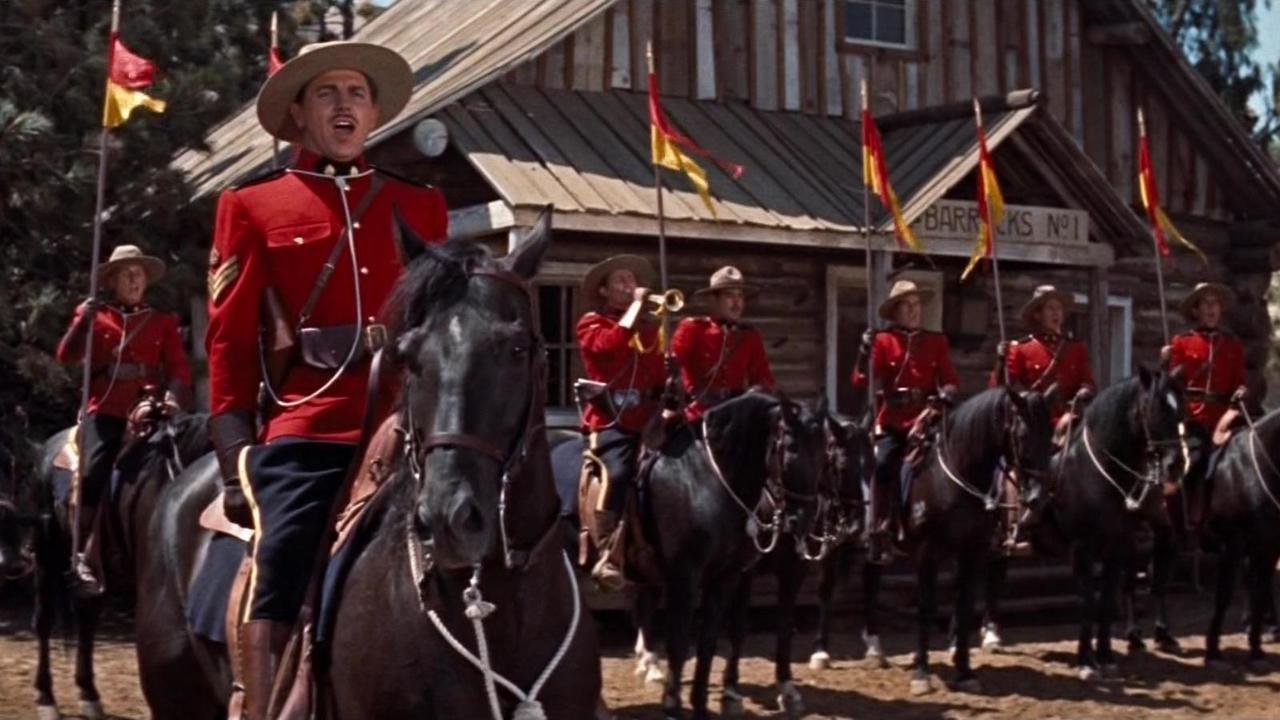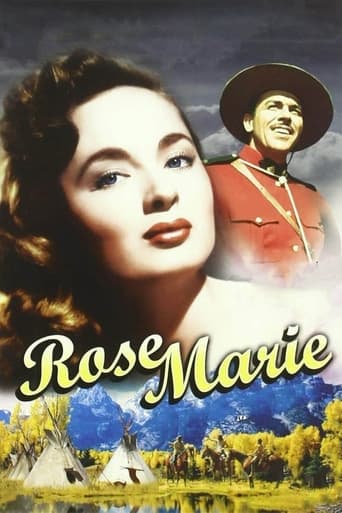EssenceStory
Well Deserved Praise
Teringer
An Exercise In Nonsense
Roy Hart
If you're interested in the topic at hand, you should just watch it and judge yourself because the reviews have gone very biased by people that didn't even watch it and just hate (or love) the creator. I liked it, it was well written, narrated, and directed and it was about a topic that interests me.
Kinley
This movie feels like it was made purely to piss off people who want good shows
TheLittleSongbird
It's hard to say which is the better film of the 1936 film, starring Nelson Eddy and Jeanette MacDonald, or this version from 1954. Neither are "great" films but both are enjoyable in their own way, probably put them on the same level but for different reasons.'Rose Marie' holds the historical distinction of being the first colour CinemaScope musical. This said, warts and all, it does have much more than just historical interest. From the rating, one would assume that it is a mediocre film or worse. To me, it is a long way from being either and not too shabby at all. If anything, while it could have been better, it's pretty good and the main reasons to see it don't disappoint.Some of the comedy does fall flat, feeling both overegged and leaden, some of the dialogue being barely amusing. As a consequence of trying to do something with it, both Burt Lahr and Marjorie Main try far too hard and end up rather annoying, Lahr especially overdoes it.The story is re-worked, and while less creaky, a little tighter paced and schmaltzy than the previous version, it's still a bit on the flimsy side with some character agreed being given short shrift and disappear without warning for long stretches. The first half also drags and takes a while to get going.On the other hand, 'Rose Marie' looks great, with much made out of the marvellous scenery and done justice by truly beautiful photography. The standouts are the three songs lifted out of the operetta, being the title song, "Indian Love Call" and "Mounties". With the other songs, "I Have the Love" and "Free to be Free" are particularly lovely. The weak link is "I'm a Mountie who Never Got His Man" which isn't as well placed as the rest and barely passes muster as a particularly great song.Furthermore, they are nicely and efficiently choreographed. The high-spot, and perhaps the highlight of the entire film, is the jaw-dropping choreography of "Totem Tom-Tom" (don't let the title fool you, it's hugely entertaining and nothing to be offended over). The romantic elements are sweet and touching.Howard Keel is a little wooden at times but on the most part it is a robust and charming performance, and he sings magnificently as always. Lovely Ann Blyth, who also acquits herself well in the singing, and Joan Taylor (as a new character) are more than able support for him, and while Fernando Lamas seemed an unlikely choice for his role he pulls it off surprisingly well.All in all, pretty good musical and more than just historical interest for being the first colour CinemaScope musical. 7/10 Bethany Cox
weezeralfalfa
Very different from the '36 Jeanette MacDonald-Nelson Eddy version. The screenplay more resembles the plot details of the 1924 play. However, it thankfully simplifies the excessively complicated romantic relationships of the play. The '36 version further simplified the romantic entanglements, with Eddy having no legitimate competition for Jeanette's heart. That's the way Eddy liked his films with Jeanette. Here, Howard Keel's and Fernando Lamas' characters compete for Rose Marie's(Ann Blythe) heart, although clearly she thinks of Keel's Mountie character as more of a father figure. Keel sings the classic Friml-Harbach-Hammerstein songs "The Mounties" and 'Rose Marie". Ann initiates the classic "Indian Love Call" on several occasions, with Lamas responding.Blythe's frontierswoman persona will remind you of the character of Anne, in "Anne get Your Gun", and Calamity Jane, in the film of the same name, released just the year before. Keel was the male lead in both of those films, in which the woman eventually is 'civilized' sufficiently to become an acceptable mate for him. In this film, the same transformation is attempted. but, in the end, Keel realizes that Rose Marie, in her current state of mind, wouldn't be happy as a mountie's settled wife. She prefers to wander in the wilderness, as expressed in the new song by Frimi and Webster "Free to Be Free". Thus, he eventually facilities her reunion with wandering trapper, of dubious reputation: Jim Duval(Lamas), whose life he had recently spared, when he was wrongly sentenced to death for the murder of an Indian chief. In contrast, in the '36 film, the Mountie played by Eddy captures Marie's cherished brother, who had escaped from prison, and who presumably will be sentenced to death for a murder committed during that escape. Regardless, Marie's love for Eddy's character is not extinguished: a rather awkward response. Superficially, the characterization of Rose Marie here couldn't be more different from the '36 version, where she has been a city-confined prima dona of the opera stage. However, they have the feminist commonality of initially feeling that they don't need a man and children to feel fulfilled.Margie Main: the hotel proprietor, and Bert Lahr, as an aging Mountie, are included as would be comic reliefs. Lahr does get to do a humorous take on Keel's "Mounties", with "I'm a Mounty Who Never Got his Man", in his inimical style. Unfortunately, their main interaction together was deleted, although it's included as an extra on the current DVD release. Keel seems unusually wooden, especially in his speech, in this film, compared to his other films I've seen: a charge often leveled(unjustifiably, in my opinion) at Nelson Eddy. Perhaps because he isn't the romantic lead? This, along with his monotone speaking is the chief distraction I find with this film. Ann is fine as Rose Marie, and Lamas as her new found 'bad boy' love, with a similar wanderlust.In the play, Black Eagle is Wanda's lover, not tribal chief, and she kills him to protect another of her lovers, not included in this film, from his wrath. In the '36 film version, her role is minimal. However, in the present version, she kills Black Eagle as revenge for a beating by him for her dalliance with Duval. However, having seen Duval together with Rose Marie, as observers of the Totem Pole Dance, she remains quiet when Duval is blamed for the murder, partially as revenge for his abandonment of her for Rose Marie.The Totem Pole Dance, staged by Busby Berkeley, utilizes a new song, rather than the original, as in the '36 version. It is a much more modern stylized dance than in the '36 film. Wanda is the lone female, surrounded by a bevy of men, who cavort with her. It comes across as a sort of fertility dance. Joan Taylor, who played Wanda, was most frequently cast in westerns, including some TV series.Incidentally, sensible frontiersmen didn't wear coonskin caps in the warm season. They were too hot! That was just a standard Hollywood detail to denote a backwoods frontiersman(or woman, in this case).Now that both this film and the '36 version are currently available for purchase on DVD, we can easily compare them. To me, both have their merits and minuses. However, I suspect the younger generation will clearly favor this version, for its CinemaScope filming and more modern screenplay and acting. However, I find the singing more fervent in the '36 film. Also, I generally prefer the acting of Jeanette and Eddy over that of Ann and Keel. I also prefer "Anne Get Your Gun" and "Calamity Jane" over this film.
rubyleah
Although I love the singing of Jeannette MacDonald and Nelson Eddy, their acting is too much the product of that time, affected. That is why I prefer the 1954 movie version of Rose Marie, with Oscar-winning actress Ann Blyth who has a lovely young-sounding lyric soprano in the title role. The two male leads, Howard Keel and Fernando Lamas, have always been known to be excellent singers, as far back as I can remember.I would like to refute someone's synopsis where he says that Rose Marie and the Mountie fall in love with each other. This is not true. The Mountie (Howard Keel) falls in love with his ward, but Rose Marie's love is Jim Duval (Fernando Lamas). Rose Marie sings "Indian Love Call" and "I Have the Love" to Duval and he to her. These two songs are among the most beautiful love songs ever composed. The exuberant "Free To Be Free" accurately evokes the feeling of preferring the state of "being free." Ann Blyth sings this with just the right amount of emphatic insistence and earnestness. I would love to know where I can purchase the sheet music of these songs, or even the entire Rose Marie songbook (movie version).
Sheila_Beers
Not enough good things can be said about this beautiful musical, one of my favorites. It has the right combination of romance, conflict, suspense, tragedy, and comedy in the plot. The setting is in the colonial or exploration era of Canada, and the rivalry between English and French Canadians is evident.The story is about Rose Marie (Ann Blyth), a tomboyish girl that her guardian Mountie (Howard Keel) tries to civilize. Rose Marie is grateful to him, but she truly loves the French trader Duval (Fernando Lamas), who accepts her as she is. The unrequited love an Indian girl has for Duval adds to the conflict and leads to the tragic elements in the film. However, justice and a happy ending prevail.I commend Turner Broadcasting for keeping "Rose Marie" alive by showing it on the movie channel, but I would love to have a quality DVD version. I hope it will be on DVD soon.The film has inspired me to look for the sheet music and script from the musical, and I am very disappointed that I cannot find a "Rosemarie" songbook. If any music and script publishers are listening, they should have the score and script of this film in print.

